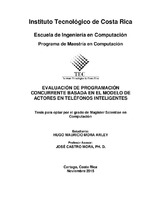Mostrar el registro sencillo del ítem
Evaluación de programación concurrente basada en el modelo de actores en teléfonos inteligentes.
| dc.contributor.advisor | Castro-Mora, José | es |
| dc.contributor.author | Mora-Arley, Hugo Mauricio | |
| dc.date.accessioned | 2016-10-28T22:46:31Z | |
| dc.date.available | 2016-10-28T22:46:31Z | |
| dc.date.issued | 2015 | |
| dc.identifier.uri | https://hdl.handle.net/2238/6682 | |
| dc.description | Proyecto de Graduación (Maestría en Computación) Instituto Tecnológico de Costa Rica, Escuela de Ingeniería en Computación, 2015. | es |
| dc.description.abstract | Mobile devices known as smartphones are evolving to incorporate several processors and a RAM memory greater than a gigabyte in response to the high resource demand of today’s software applications. These devices were designed to be highly available information devices and are equipped with special features for that purpose; they are designed in a way that facilitates their mobility from place to place and with the use of a battery as a power source to provide considerable autonomy. Even with the recent evolution of these devices, the goal for them remains the same: high information availability (anytime, anywhere). These devices are not designed for high computational loads, the processor’s intensive work blocks the high availability of information (a busy processor doesn’t address alternate requests for information handling), however, the increasing power of these devices opens the scenario for using the concurrent processing features of their multiple processors for other possibilities. Also, given the ir current popularity and ubiquity, these devices may become useful in the distributed computing scenario, where the solution of complex computational tasks may be shared between many devices [29]. Nowadays there are yet some applications requiring information intensive processing on the smartphones [17] [28] [38]. Concurrent programming offers promising approaches to help in the creation of parallel and distributed systems. The Actors Model [7] is an interesting paradigm because it is a design that helps to minimize complex programming errors using the system resources in parallel and distributed environments. This research evaluates the performance of the concurrent programming using the Actors Model in mobile devices called smartphones. | es |
| dc.description.sponsorship | Instituto Tecnológico de Costa Rica. Escuela de Ingeniería en Computación. | es |
| dc.language.iso | spa | es |
| dc.publisher | Instituto Tecnológico de Costa Rica. | es |
| dc.rights | acceso abierto | es |
| dc.subject | Información | es |
| dc.subject | Procesadores | es |
| dc.subject | Aplicaciones | es |
| dc.subject | Complejidad computacional | es |
| dc.title | Evaluación de programación concurrente basada en el modelo de actores en teléfonos inteligentes. | es |
| dc.type | tesis de maestría | es |
Ficheros en el ítem
Este ítem aparece en la(s) siguiente(s) colección(ones)
-
Maestría en Computación [119]


